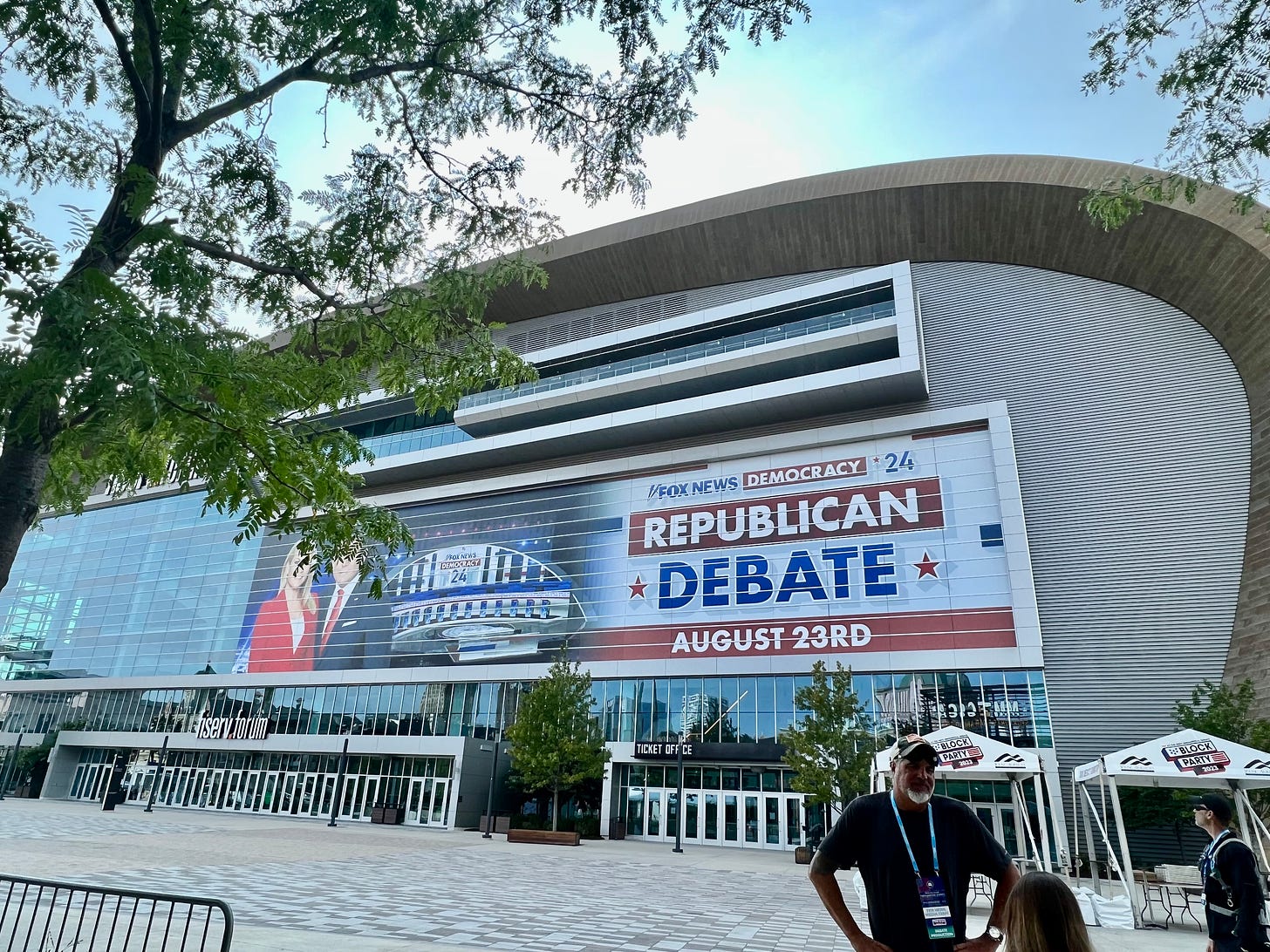Trump Likely to Upstage Opponents Even if Absent from Debate
Who will be mentioned on the Republicans' debate stage more: Donald Trump or Joe Biden?
MILWAUKEE — The first big event of the 2024 U.S. presidential election campaign will be held Wednesday when candidates of the Republican Party meet on a debate stage here in this Midwestern city in the state of Wisconsin.
Nine candidates have qualified under the Republican Party's rules to be on the stage inside the Fiserv Forum, the overwhelming front-runner — former President Donald Trump — says he will be skipping the event
Few of the participants have been outspoken in criticizing Trump. Former New Jersey Gov. Chris Christie is an exception. Others, such as Florida Gov. Ron DeSantis, who is running a distant second to Trump, and former South Carolina Gov. Nikki Haley, have taken a more measured approach, hoping to convince a party base that remains loyal to Trump that they can implement the former president's right-wing "Make America Great Again" agenda without the legal encumbrances and other controversies.
Then there is Trump's former vice president, Mike Pence, who defends his ceremonial certification of the 2020 election results against Trump's wishes. He is still in the low single digits in most polls of potential 2024 Republican voters.
In addition to Pence, Christie, DeSantis and Haley, others who have qualified for the event hosted by Fox News are Ohio businessman Vivek Ramaswamy, South Carolina Sen. Tim Scott, North Dakota Gov. Doug Burgum and former Arkansas Gov. Asa Hutchinson.
One of those who failed to make the cut, Will Hurd, a former congressman from Texas and one of the few Trump critics in the race, says “the lack of transparency and confusion around the RNC’s debate requirements is antithetical to the democratic process.”
Two other candidates disqualified from Wednesday’s debate stage, Larry Elder and Perry Johnson, say they will file lawsuits against the RNC.
Trump posted on his social media platform Truth Social on Sunday that due to his vast lead in the polls and his known accomplishments during his one term as president, "I WILL THEREFORE NOT BE DOING THE DEBATES."
Trump reportedly was referring to the first two debates of the primary airing on Fox News, including next month's face-off in California, leaving open the possibility he is willing to face Republican rivals on stage later in the campaign season.
The former president has recently turned critical of Fox News, which championed his candidacy in the last two presidential elections. But the media empire of magnate Rupert Murdoch, which owns Fox News, has taken a more measured approach to Trump amid the current crowded field of Republican contenders.
Trump has also stated he will not sign the RNC's "loyalty pledge," which asks all the primary losers to eventually support the nominee, one of the requirements for participating in the Milwaukee debate.
"Surprise, surprise… the guy who is out on bail from four jurisdictions and can't defend his reprehensible conduct, is running scared and hiding from the debate stage," Christie posted Friday on X, the platform formerly known as Twitter, foreshadowing the rhetoric he is expected to unleash against the absent front-runner on Wednesday. Christie added that Trump is a "certified loser, verified coward."
Even without Trump exchanging insults with Christie and others, the conversation at the event is anticipated to be largely about him, including the more than 90 felony charges the former president faces for alleged crimes committed before, during and after his presidency
"It creates a very, very difficult environment for the other Republicans, because they have their own ideas for what they want to do with respect to key issues like the economy or Ukraine or immigration. But that doesn't mean they'll have much of a chance to talk about it. They'll be asked about Donald Trump," predicts Stephen Farnsworth, a political science professor at the University of Mary Washington.
The debate will not be very consequential for Trump — he will still be the front-runner regardless of what happens. But for the others, there could be a viral moment, good or bad, that significantly changes their polling numbers.
"We've seen from debates in past election seasons that candidates sometimes have a moment in a debate that ends up disqualifying them because they look bad. We've also seen moments in past debates where candidates have said something that got a lot of attention for them in a positive way and gave them a huge boost," notes Provost Associate Professor Jordan Tama of American University's School of International Service.
DeSantis is the candidate who perhaps has the most at stake. Once touted as the party's Trump slayer, the second-term governor has dropped in the polls. In a few surveys, the relatively unknown Ramaswamy has pulled even with or surpassed DeSantis for distant second place
.“I think DeSantis has the most to lose. Vivek Ramaswamy probably has the most to gain. There’s a lot of people coming over to him,” Trump’s first White House press secretary, Sean Spicer, told me outside the debate venue on Tuesday.
"This is his moment," says Farnsworth of DeSantis. "Remember, in 49 other states, these people do not know the governor of Florida. They maybe have seen a little bit on the news here and there. But most of the coverage is focused on the former president. As a result, Ron DeSantis will be introducing himself to the country. And one of the things he needs to do is make a good first impression. If he doesn't, he won't be able to really change the dynamics of the race in a significant way."
The Fox News moderators are also certain to attempt to draw the candidates out on why they would be a better leader than President Joe Biden, the presumptive Democratic Party nominee, who would be 82 if he is inaugurated in January 2025.
The first Republican Party debate also puts the spotlight on Wisconsin, one of the few states expected to provide a true contest between the two major parties in next year's presidential election. Milwaukee will host the Republican Party's nominating convention next July.
Four of the last six presidential elections have been decided by less than a percentage point in Wisconsin. Trump won narrowly in the state in 2016 before losing by a similar margin to Biden four years later.





